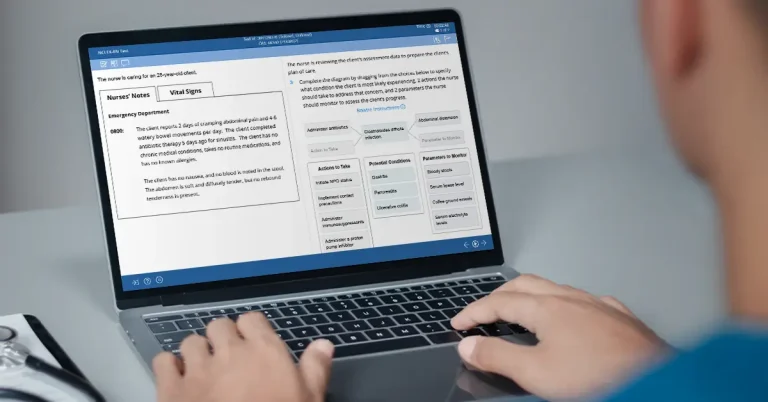Nurses face many ethical dilemmas in today’s society. From respecting patient autonomy to providing appropriate emotional support, these patient care specialists are challenged every day to offer compassionate care while also maintaining professional boundaries. As a nursing educator, you hold the power to shape the future of patient safety. By cultivating ethical and competent nurses, you contribute directly to improving healthcare outcomes for countless individuals.
The AACN Essentials1 offers a framework that includes the importance of ethics in nursing education, establishing quality standards, and guiding schools to meet them. Certified nursing programs that follow the AACN Essentials are well-equipped to prepare students for today’s ethical challenges, providing thorough and relevant training.
The AACN Essentials and Ethics Competency
The AACN Essentials outline the core competencies needed for nursing school graduates, setting high standards for nursing programs. As of April 2021,2 Essentials have adopted a competency-based approach, organizing skills under 10 domains relevant to all levels and specialties within nursing. Each domain is supported by clear, observable, and measurable sub-competencies.
Ethics competency is a core concept woven throughout all 10 domains of the AACN Essentials:
- Knowledge for Nursing Practice: Understanding and applying ethical principles in clinical decision-making
- Person-Centered Care: Demonstrating ethical skills like active listening and tailored communication to respect individual beliefs and values
- Population Health: Addressing ethical considerations in public health initiatives and interventions
- Scholarship for the Nursing Discipline: Upholding ethical standards in research and evidence-based practice
- Quality and Safety: Ensuring ethical practices in patient safety and quality improvement efforts
- Interprofessional Partnerships: Promoting ethical collaboration and communication within healthcare teams
- Systems-Based Practice: Navigating ethical issues in healthcare systems and policies
- Informatics and Healthcare Technologies: Maintaining ethical standards in the use of healthcare technology and patient data
- Professionalism: Embodying ethical behavior and decision-making in all professional interactions
- Personal, Professional, and Leadership Development: Cultivating ethical leadership and personal integrity
Ethical skills such as understanding cultural and educational disparities are essential in the Person-Centered Care domain. As a nurse educator, you must impart relationship-centered care to your students, training them to consider each patient's cultural norms and perspectives. For instance, they could ensure that a patient with a limited ability to read fully understands any paperwork that needs to be signed before going through a medical procedure. Effective communication involves using various modes appropriate for different contexts, conducting sensitive conversations, and using evidence-based teaching materials that account for health literacy, vision, hearing, and cultural sensitivity. This ensures that care is personalized and respects the dignity and needs of each patient.
Common Nursing Ethical Dilemmas
Many of the ethical dilemmas nurses encounter require careful consideration. Some common examples include balancing patient autonomy with beneficence when a patient refuses necessary treatment, addressing inadequate staffing that may compromise patient care, and navigating end-of-life decisions with patients and families.
Substance abuse among medical professionals is another significant concern due to the unique challenges and pressures they face in their work environment. This also highlights the importance of teaching nursing students about self-care and resilience within the profession.
Additionally, nurses may face situations where they must decide whether to report a colleague's errors. Conflicts between empirical medical knowledge and a patient’s religious or cultural beliefs also could impact treatment decisions. These impasses require nurses to carefully weigh their professional obligations, patient rights, and ethical principles to determine the most appropriate course of action, which is why integrating ethics into nursing education is so important.
Integrating Ethics into Nursing Education
Case studies and role-playing will help your students learn and apply ethical principles in real-life situations. A 2022 study comparing role-playing to lecture methods found that role-playing had a greater positive effect on promoting ethical sensitivity and performance in nursing students.3
Your curriculum should also have dedicated ethics courses and integrate ethical considerations throughout all nursing education. Encourage open discussions about ethical dilemmas and provide resources such as the American Nurses Association (ANA) Code of Ethics4 to enhance your students' understanding and application of ethical principles.
Assessing & Evaluating Ethics Competency in Nursing
Evaluating ethics competency in nursing students requires formative and summative assessments. Formative evaluations, such as reflective journals and peer reviews, give your students the feedback they need to improve their ethical decision-making skills. Summative evaluations, including exams and practical tests, measure how well your students apply ethical principles in clinical settings.
Using the Moral Distress Thermometer5 and the Hospital Ethical Climate Survey6 can help you evaluate the ethical atmosphere of educational environments and identify areas that need improvement.
Using UWorld to Build Ethics Skills in Nursing Students
UWorld offers a suite of resources designed to develop ethics and compassionate care skills in nursing students. Our products include active-learning best practices, engaging video lessons, interactive exercises, and targeted practice questions with detailed answer rationales. These tools will help your students understand ethical core competencies, increase retention, and develop stronger ethical judgment skills for a clinical setting.
Our case studies and ethical dilemma scenarios allow your students to engage in real-life situations where they must navigate complex decisions, fostering critical thinking and ethical reasoning. By reviewing detailed rationales for each scenario, your students can learn the reasoning behind ethical choices and apply these principles in their clinical practice. This comprehensive approach ensures that students are knowledgeable and proficient in making ethical decisions in real-world settings.
Additional Ethics Resources for Nurse Educators
As a nursing educator, you have access to a variety of resources to support ethics education. The AACN provides Essentials resources1 and a curricular transition guide7, and the ANA offers the Code of Ethics8 and position statements on various ethical issues9. Journals and professional organizations, such as the American Journal of Nursing10 and the National League for Nursing11, publish research and articles on ethics in nursing education. Utilizing these resources can help you stay informed about best practices and innovative strategies for teaching ethics.
References
- American Association of Colleges of Nursing. (n.d.). The Essentials: Core competencies for professional nursing education. Retrieved from https://www.aacnnursing.org/essentials
- Alexander, M., DeLuca, S., Hirsch, C., & Packard, K. (2022). Essentials: Core competencies for professional nursing education. Journal of Nursing Regulation, 13(1), S10-S16. https://doi.org/10.1016/S2155-8256(22)00009-6
- Ethical Principles in Nursing. (2022). Retrieved from https://pubmed.ncbi.nlm.nih.gov/35568451/
- American Nurses Association. (n.d.). Code of Ethics for Nurses. Retrieved from https://www.nursingworld.org/practice-policy/nursing-excellence/ethics/code-of-ethics-for-nurses/
- Ethics and Nursing Practice. (2012). Retrieved from https://pubmed.ncbi.nlm.nih.gov/22607094/
- Hilliard, A., & Tran, K. (2022). Developing ethical competence in nursing practice. BMC Nursing, 21(1), 67. https://doi.org/10.1186/s12912-022-01067-x
- American Association of Colleges of Nursing. (2021). Guide to Curricular Transition for Competency-Based Education. Retrieved from https://www.aacnnursing.org/Portals/0/PDFs/Essentials/Guide-to-Curricular-Transition-for-Competency-Based-Education.pdf
- American Nurses Association. (n.d.). Code of Ethics for Nurses. Retrieved from https://www.nursingworld.org/practice-policy/nursing-excellence/ethics/code-of-ethics-for-nurses/
- American Association of Colleges of Nursing. (n.d.). Policy and Advocacy: Position Statements. Retrieved from https://www.aacn.org/policy-and-advocacy/position-statements
- American Journal of Nursing. (n.d.). Retrieved from https://journals.lww.com/ajnonline/pages/default.aspx
- National League for Nursing. (n.d.). Retrieved from https://www.nln.org/







